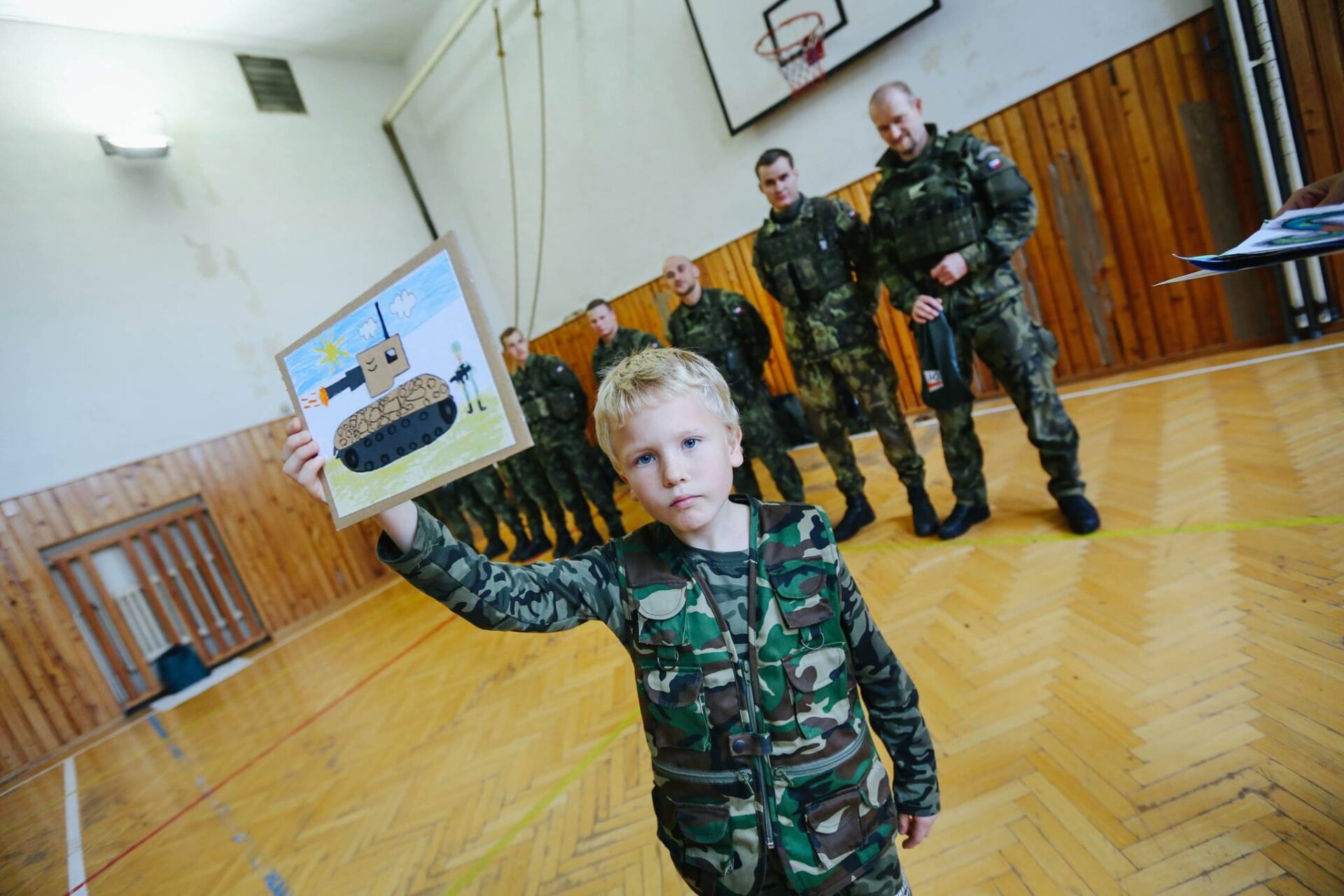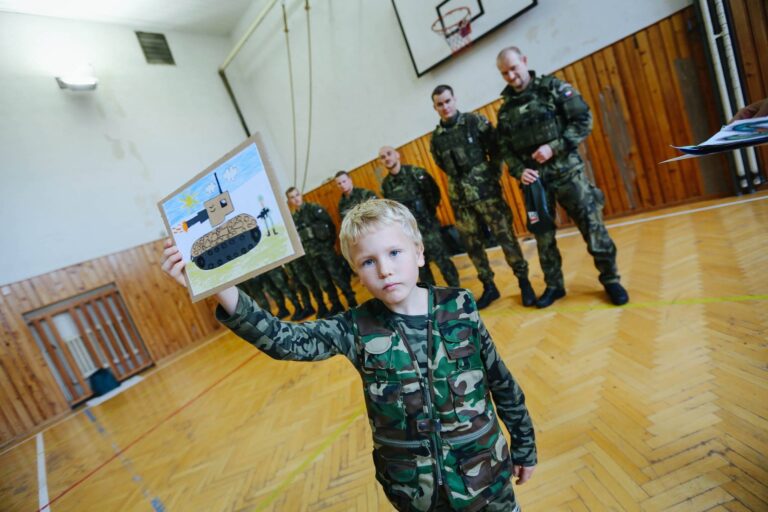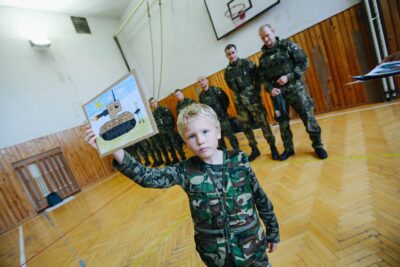Children marching in raincoats with gas masks over their faces. It is a memory that comes to the minds of people who went to school in the Czech Republic before 1989. After the Soviet Union break-up, the picture of national defence education disappeared from the life of schools, just as compulsory Russian classes.
The memory came back to life in 2012. The Czech Ministry of Defence came up with a new idea. A report on the nation’s preparedness to defend the country mentions a major problem: “the issue of preparing people to defend the country is not sufficiently highlighted in the curricula of primary and secondary schools or universities.”
The solution is described a few pages later. The new concept is to implement national defence education in school curricula, in which “the age of students and the specialization of their schools will be taken into account”. The report says that adding national defence education to school curricula “creates positive values based on historical experience and influences their (students’ – note VSquare) attitudes to the defence of the country…The preparation is led by pedagogical experts.”
New plan, old methods
In 2018, the Czech army welcomed 2,000 new recruits. Although the headcount of the Czech army is 20,000, the government planned to reach 24,000. The goal is 30,000 soldiers by 2026. The attractiveness of being a military man has been decreasing over the recent years. Compulsory military service ended in 2004. Since then, the Ministry of Defence has had to find other ways of recruiting new members.
František Šulc was the chief advisor to the Czech Minister of Defence in 2012, when the bill on defence education in schools was passed. He strongly supports the bill, even though the development of the idea got stuck in 2012, as he admits. The project has to face the pressure of bureaucracy that has been put onto it.
“My biggest objection to the defence education is it is too bureaucratic. The Czech state does not use the potential of former soldiers who could be excellent examples, telling their stories. The modern history of the Czech Republic is not well covered in schools. Presentation of armed forces is important for building people’s relationship to the country. School curricula should include the ideals on which our country grew up. The army and other first responders have always taken part in it. Children should know one of the pillars of the state.”
The idea of building nationalist awareness in children became reality in 2013. Teachers needed to follow a new school syllabus but in many cases they have been struggling to put the defence education into practice. The Ministry of Defence created an organization called POKOS (Příprava občanů k obraně státu – Vsquare translation: Preparation of Citizens to Defend the State). POKOS became the sole organization to implement the practical part of defence education, which is usually provided by the Czech Army. It also issued a brochure, which is available on its website.
Modern military marketing
Hanka Zoor Svačinková works for an NGO Nesehnutí dedicated to gun control issues. She has witnessed a number of the “lectures” given by the Czech Army herself.
“The Ministry of Defence did not provide any other alternative way of implementing the defence education. The subject of state defence is taught by means of Czech Army presentations. We believe that, if it is a part of school syllabus, it needs to be looked at by a teacher. I have seen a lecture by POKOS where the speakers were soldiers who presented the army. They gave their opinions for facts. They put guns into children´s hands. There was a little girl who did not want to touch it, and they forced her to try it. They advised children on how to get into the army and gave them presents if they answered questions correctly. One of the gifts was a key-ring the shape of a hand grenade. To me, it looks like a recruitment technique” Zoor Svačinková describes her doubts about the objectivity of defence education by the Czech Army.
Šulc also sees the potential in the lectures to gain new recruits for the Czech army. However, he sees it as a key advantage: “Recruitment is one of the crucial abilities of an army. I think this is one way to do it, because if children have enough information, they can easily become soldiers. It is better when they get information from soldiers themselves instead of teachers. They do not know what the army is about. By this way of presentation we can avoid other nationalist extremes. Labour market situation will be more difficult and the army needs to do marketing the same as the other divisions do.”
The army tries to make its presentation as attractive as possible. Depending on the availability of the “equipment”, presentations at schools differ from one another. Sometimes, a military helicopter will land near a school, the other time big military vehicles will drive around with the whole class loaded inside. One on the most attractive and, at the same time, the most problematic “part” is handling guns.
“Guns are part of our society. I think it is better to show children guns under supervision. Today’s children are just as interested in military vehicles and guns, as my generation was. Should we make it forbidden? I am not saying bring guns to each family. I am trying to explain my point of view that it is a strong experience for children and if we allow it to them, they will not look for other ways to try it. If we deny the existence of guns, they will not disappear. But we can build a respect in children” Šulc says in support of demonstrating the guns to the kids.
Czech guns are like Czech gold
Candidates for the gun certificate know that the golden rule of handling a gun is to act like it could fire anytime. In other words, a person holding a gun should not aim at a target unless he or she is shooting. Special care needs to be taken if children are around. However, controversial photos still appear on Facebook from time to time. The latest shock for the activists came last summer. The organization POKOS published photos of children holding guns and aiming at the photographer.
Zoor Svačinková criticized particularly strongly the impact the presence of guns had on children under 10 years old. The defence education is aimed at older children, but younger are also attracted by real guns. “I saw that during breaks younger children would make an ’excursion’ to the older classes, where the guns were lying around. They approached them without any context, which could be dangerous” comments the activist. This situation has been highlighted by her NGO as a public comment to the new structure of school syllabus. Another suggestion was to emphasize diplomatic solutions to conflicts. The Ministry of Defence promised to include the comments and issued a second brochure in 2017, which should be amended.
However, the final implementation is again in the hands of head teachers. The decision on who will be invited to do defence education in their schools lies in their hands. Since the demand exceeds the available offer, the Czech army does presentations only in a few selected schools. Head teachers go around in circles. Children are attracted by “cool” military presentations and head teachers want their schools to be “selected”. The remaining “unselected” schools need to find their own way to meet the syllabus. One unfortunate way is to invite paramilitary organizations, which present themselves as “soldiers in reserve”. For amateurs or children, they could be hard to distinguish from real soldiers. However, their rhetoric could carry signs of extreme nationalism.
The 2018 report by the NGO Nesehnutí says that: „For example, Českoslovenští vojáci v záloze za mír (Czechoslovak Armed Reserves for Peace – Vsquare note) is a manifestly pro-Russian and anti-state extremist organization. It has led ’defence education days‘ in schools in the Moravian-Silesian Region. According to BIS (Security Information Service – Vsquare note), there are about two thousand people in the so-called militia in the Czech Republic, with links to extremist or nationalist political parties, who pose a serious threat to democracy.”
A change is necessary to prevent the so-called military experts from being invited to schools to present a dangerous form of nationalism.
“POKOS was a first attempt to make a change. But honestly, it is too bureaucratic. This form of defence education needs to be discussed between Ministries of Defence and Education. Not just by planning, but also by implementation. It needs to be more systematic,” Mr. Šulc, the former advisor to the Ministry of Defence suggests one of the possible solutions.
Schools have a free choice of how they would like to fulfil the defence education duty, but they would rather rely on “experts”. Except of members of militia, head teachers need to be aware of other “experts” in the field. The military lobby is deeply rooted in the Czech Republic.
“The military lobby is linked to high profile politicians in the Czech Republic. One of the biggest arms manufacturers Česká zbrojovka contributed to the methodical brochure. Its advertisements were shown on TV screens in schools. For them, it is a big advantage to make children familiar with guns at an early age. They could be their potential future clients. Our president Zeman is boasting about guns being products just like anything else. In the past, the Czech Republic excelled in global arms industry. We are proud that our guns are used in wars all over the world. Czech guns are like Czech gold – they are the source of our patriotism” explains activist Zoor Svačinková.
This article is a part of a research supported by the IJ4EU grant. The IJ4EU fund is not responsible for the content and any use made out of it.

Eva is a journalist working for investigace.cz based in Prague. Investigace.cz is NGO covering organized crime topics and the only Czech partner of OCCRP. She works on projects connected to Slovakia.






